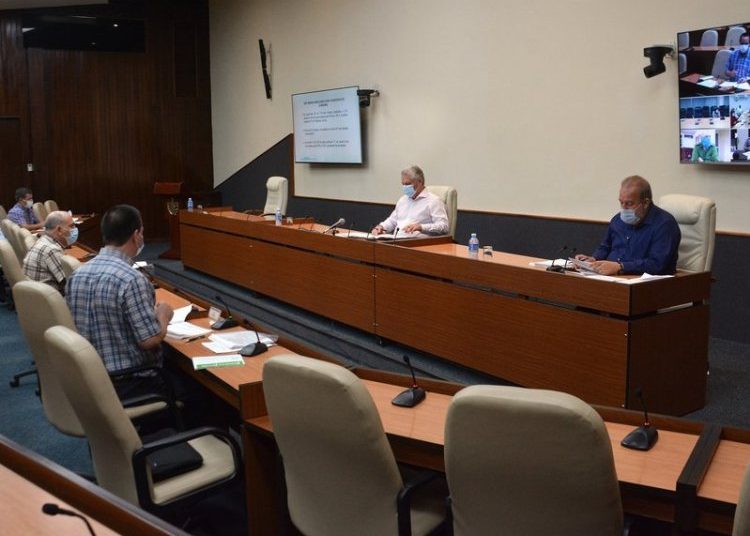The Cuban authorities will act “with severity” against “those who continue to defy the measures the country has taken against COVID-19,” according to reports from the island’s press.
President Miguel Díaz-Canel urged the police force to act more rigorously towards people “who continue in public places without reason, walking or sitting in parks,” despite warnings from the government and the Ministry of Public Health (MINSAP) on the importance of practicing social isolation to contain the transmission of the disease, which already accumulates 1,189 positive cases and 40 deaths in Cuba.
This was stated by Díaz-Canel this Tuesday by videoconference to Colonel Eddy Sierra, second chief of the General Directorate of the Cuban Police Force, whom he told that if the necessary actions are not taken, “we will continue to have people on the streets and so it is very difficult contain the spread.”
“Whoever is not in a line for a procedure or a purchase, must be sent home and, if they resist, other decisions must be made,” said the president, according to statements quoted by Cubadebate.
“A social isolation measure, which includes that only one person per family can go to the place where some service is being provided for the population, has been approved here. Therefore, there doesn’t have to be people in the parks, not even walking through the streets. We are going to act more directly against all those people,” explained the president.
This isn’t the first time that the Cuban government alerts the population about the importance of abiding by the measures applied and calls on the police forces―whose presence has been reinforced during the pandemic―to enforce the provisions, despite which many people remain on the streets and do not assume the health recommendations with the greatest responsibility. The president had previously affirmed that it was no longer the time to warn, but to act, based on which the Cuban media have been reporting on fines and legal processes applied to detected offenders.
In addition, Díaz-Canel commented on the resellers and hoarders who remain on the streets and are the subject of complaints from the population, at a time when lines are multiplying throughout the island and the government has redistributed and regulated the sale of basic need products―such as food and toiletries―as part of the measures taken in the face of the coronavirus pandemic.
“We must also act against those people (resellers and hoarders), no one here can be carrying out illegal activities, no one here is authorized to sell or resell anything, and it cannot be allowed,” said the president, who explained that “the little we have we’re trying to give it in the grocery stores and in the chain stores, in our markets.”
“There is no need to explain anything anymore, what is needed is to act with severity; because those are the people who are making the situation more complex for us,” he affirmed.
Díaz-Canel also emphasized giving priority attention to the health personnel facing the pandemic and also guaranteeing their families the provisions “they cannot obtain due to the work they do,” and called for “organizing a phone line to give psychological care to the population, with specialists who can help cope with this situation of isolation,” Cubadebate said.
Meanwhile, Minister of Public Health Dr. José Angel Portal explained that in Cuba there are 32 transmission events in 12 provinces. The last two to join were one in the Guiteras People’s Council, in Habana del Este, a place where “sanitary measures were reinforced”; and another at the La Fe People’s Council, on the Isla de la Juventud, where a quarantine was decreed.
The Isla de la Juventud is precisely the Cuban territory with the highest incidence rate of positive cases by number of inhabitants, followed by Villa Clara and Havana, which has the largest number of patients in the country.
Finally, Portal referred to the self-screening through an application for mobile devices, through which close to 22,000 people had self-screened themselves until this Tuesday, of which 105 reported being contacts of positive cases and more than 3,000 said they had symptoms.
However, according to reports, 1,191 people declared false data, in the face of which Prime Minister Manuel Marrero said that “the measures to be applied will be assessed.”
“This is a program that allows a further step forward in the confrontation against COVID-19. However, a group of people are using this to distort the attention of health personnel, in the midst of the difficult situation in the country and that cannot be allowed,” he said.










